- Home
- Laura Resnick
The Misfortune Cookie ed-6
The Misfortune Cookie ed-6 Read online
The Misfortune Cookie
( Esther Diamond - 6 )
Laura Resnick
Esther Diamond's year gets off to a rocky start when NYPD's Detective Connor Lopez, who slept with her and then didn't call, shuts down her current place of employment and gets her arrested. Once she's out of handcuffs, and with no paying work on the frigid horizon, Esther takes a small role in a grad student's film project in Chinatown—where her friend semi-retired hit man Lucky Battistuzzi, who escaped Lopez's sweep at the Little Italy restaurant where Esther works between acting jobs, is hiding out in a Chinese-Italian mortuary.
Esther and Lucky soon realize that something strange is going on in Chinatown, where beautifully handcrafted fortune cookies are inflicting deadly mystical curses on the hapless victims who receive them as gifts—and before long, Esther learns that Detective Lopez is one of the recipients. As preparations for Chinese New Year heat up in the ice-covered neighborhood, when the streets will be filled with costumed lion dancers, firecrackers, and dense crowds, Esther and Lucky summon the help of their friend Max, a semi-immortal mage and semi-solvent bookseller, to help them save Chinatown and Lopez (with whom Esther is not on speaking terms) from a mystical murderer of maniacal menace.
The Misfortune Cookie
Esther Diamond - 6
by
Laura Resnick
Dedication
To my dear friend Cindy Chivatero Person, who was a good sport about wading through ankle-deep slush with me in New York’s Chinatown during the Lunar New Year.
Much happiness and long life.
Prologue
Ghost Man
Sometimes in his dreams he still saw her, though she had been dead for more than a century. He saw again the grace of her tapered fingers as she poured tea, the warm smile that could unexpectedly brighten her serious face, and the intent way she listened when others spoke. Her dark eyes, so direct in their shrewdness, could be so bright with anger and so rich with tenderness. He remembered her unflinching courage, the delicate strength of her wrists as she wielded a weapon, the discipline and artistry of her body in combat . . . Her hair, when unbound and unwound, flowed like black silk . . .
And sometimes in his nightmares, he again saw her battered, blood-drenched corpse.
A world away and several lifetimes later, his memories of her were still as sharp as a blade.
“Gwai lo,” she had called him when they met. Ghost man, referring to his white skin.
It was how the Chinese referred to Westerners, and it had come to signify “foreign devil.” It was a phrase more commonly used in Canton, where her mother’s family was from, far south of where he and she met. Unfriendly at first, the phrase later became her affectionate nickname for him.
Well, he hoped it was affectionate. Li Xiuying was not a woman who readily showed her emotions, after all, and the two of them came from such different worlds. But he knew that trust, respect, even friendship had developed between them. And after her death—after it was too late—he wondered if there could have been more . . .
They knew each other so briefly, though, in that tumultuous era which crushed all tenderness in its bloody fist. And apart from the rifts of language, culture, and society that lay between them, there was also an age difference of more than two hundred years. That alone might have prevented him from ever speaking his heart to her—or even opening it wide enough to look inside it himself—if she had lived.
Even so, he thought that if he had ever known a last love, a final blossoming of that all-too-human yearning, it had been she.
Li Xiuying . . . Beautiful Flower.
Brave, gallant, talented . . . Proud, defiant, principled. Stubborn, impatient, a little sharp-tempered.
He remembered his first sight of her, her delicate skin flushed with exertion, her eyes alight with pleasure as she worked with her students. She later told him that her fighting art was called Wing Chun and had been developed by a woman in the south of China. Li Xiuying’s late mother had learned Wing Chun there many years ago before coming north with her new husband, now also deceased. She had taught it to her daughter, who now taught it to others.
He first arrived at her remote compound on a bright summer day with his one-man entourage—who was an incompetent interpreter and an even worse guide. They had been wandering in circles for days, and they had apparently broken the law in the last town they passed through. Two days ago, they had also narrowly escaped stumbling straight into a skirmish with the Boxers—the European name for the Society of Righteous and Harmonious Fists, whose rebellion against the corruption of both foreign powers and the crumbling Manchu dynasty was sweeping violently across northern China.
Upon being presented with her visitor, Li Xiuying said tersely to his interpreter, “If you and this gwai lo are looking for the Christian mission, then you’re very lost.”
He had learned enough of the language on his previous two visits to China to understand her words, and he made a gesture to silence his interpreter, who was translating this ungracious greeting into slow and stumbling English.
“I am Dr. Maximillian Zadok,” he said in careful Mandarin, talking over the interpreter, who refused to give up. “The Magnum Collegium sent me. I thought I was expected.”
The only change in his beautiful hostess’ expression was a slight pursing of the lips. After a moment, she said, “Yes. You were expected some time ago. By now, I had ceased expecting you.”
“I’m afraid my departure was delayed, and the journey took longer than expected,” Max replied apologetically. “And I have met with further delays since I arrived in China. I assume you are aware of the Boxer Rebellion?” Rather than struggling to pronounce the Chinese phrase for the current hostilities, he used the English words.
Li Xiuying glanced at Max’s interpreter, who just stared blankly at him.
Max made little punching motions as he clarified, “The Harmonious Fists. There’s fighting all over this region.”
“Yes, I know. I thought perhaps they had killed you,” Li Xiuying said dispassionately. “They are not pleased with the presence of gwai lo in China.”
“I understand. But I have not come to steal land, kill Chinese, convert people to my religion, or feed opium to children,” Max pointed out.
“The Harmonious Fists will not ask you why you are—”
“I have come to consult a respected sorceress about the mystery of my long life and slow aging, in hopes that I might unlock its secret and share that knowledge with my colleagues.” He added, “I was given to understand that the sorceress was also keen to explore this mystery.”
She said, with a change in her tone, “Your Mandarin is not good.”
“I apologize.”
“No need. Very few gwai lo bother to learn our language. I appreciate your courtesy in speaking it . . . a little.”
Max realized she was amused. He smiled ruefully. “It is a very challenging language.”
“Are you English?” she asked.
“No.”
Li Xiuying gestured to his interpreter as she said, “But that is the language he uses with you, is it not? I recognize it from the missionaries.”
“I speak English, but it is not my native tongue. I was born near Prague.”
She frowned. “Where?”
“It’s a city in Austria-Hungary.” Seeing her perplexed expression, he added, “That’s a kingdom in Europe.”
“Oh.”
“I have a certain ability with languages, but I found it very difficult to learn some Mandarin during my previous visits to China.”
“When were you here?” she asked.
“My last visit was almost 50 years ago.”
Max had arrived in 1
853, early in the long and bloody Taiping Rebellion, in which millions perished. The Manchu dynasty, which had conquered China in 1644, had presided over centuries of violent internal unrest, and it had succumbed decades ago to domination and humiliation by foreign powers. Its severely weakened government was now divided into bickering factions. Some favored siding with the Boxers, while others favored relying on the foreign powers, whose destructive influence in China was chief among the Boxers’ grievances.
China really wasn’t the best place for a gwai lo to be in 1900, least of all one who specialized in mystical Evil rather than mundane warfare and civil unrest. Max regretted giving in to the Collegium’s exhortations to make one more effort to unlock the secret of his longevity. He vowed that this was the last time. He had been blessed (or cursed) with an unusually long life, and after this, he would not waste any more of it in trying to determine exactly what alchemical formula had made it so long.
The sorceress whom he had come all this way to consult was studying him curiously. “And when was your first visit to China?”
“Oh, a long time ago,” Max replied.
“I would say the Taiping Rebellion was a long time ago,” she pointed out.
“Ah. Yes.” The longer he lived, the less easily he recognized how different his own sense of time was from everyone else’s. “My first visit was more than a century ago.” After a moment, he added, “The roads have improved.”
“May I ask when you were born?”
“Of course.” He knew that most people who met him now assumed he was in his early fifties, but his true age was nearly two hundred years older than that. Upon noticing that his interpreter couldn’t convey the date he named, Max elaborated, “My birth was approximately twelve years after the Manchus came to power in China.” Seeing how startled Li Xiuying looked, he said, “I thought this information was shared with you by the Magnum Collegium.”
“Oh, I am not the sorceress you seek,” she said.
“No?” He was surprised. Although young by his own standards, she appeared to be a mature woman and in authority here, and she had an air of gravitas that suggested power. “I beg your pardon. Who am I seeking?”
“My grandmother,” said Li Xiuying. “But I regret to inform you that she died four months ago.”
“Four months?” he repeated in dismay. Before he had even set out for China.
There were numerous ways, Max reflected wearily, in which the twentieth century was proving to be much like its predecessors.
“Grandmother looked forward to your visit. But she was very old and could not linger any longer.”
“I am sorry to hear this sad news.” Out of habit, Max added in Latin, “May God have mercy on her soul.”
Li Xiuying and the guide exchanged a puzzled glance.
Then his hostess said decisively, “You have had a long journey, and you are my grandmother’s eagerly awaited guest. You are most welcome.”
“Thank you,” said Max. “With your permission, we shall pass the night here.”
“Of course.”
“And in the morning, we will begin our return journey,” he added to his guide, who reacted with undisguised horror.
It was fortunate that Max spoke adequate Mandarin, since his unenthusiastic guide and interpreter fled during the night. It was even more fortunate that the loss of his escort delayed Max’s departure; the following day, Li Xiuying received word that the Dowager Empress had declared war against all foreign powers in China, and the foreign quarter of Peking was under siege. Max agreed to stay here while they awaited further news, rather than travel across the countryside in these circumstances, conspicuously European as he was.
The next information they received was that the Boxers, as well as government troops and authorities, were murdering foreigners throughout the region, including women and children.
Realizing what this meant, Li Xiuying rode out with a small retinue of armed warriors to protect the local Christian mission. She didn’t approve of their converting Chinese to their foreign religion, but she approved even less of wanton murder. Max, who agreed with her, insisted on accompanying her.
They arrived too late to prevent the slaughter, so they took the survivors back to Li Xiuying’s compound. This courageous act of compassion became known, as was bound to happen, and it sealed her fate. When the crisis came, thirteen days after that defiant rescue, Max honored her wishes by protecting the innocents in her care, and he accepted her decision to fight rather than flee when her home was attacked. But he knew when he saw her lifeless body that her honor had come at much too high a price. Too high, at least, for him.
Yet even now, in his dreams, sometimes she lived anew, still brave, stubborn, skilled, and beautiful, still vibrant in the bloody twilight of a decrepit and doomed dynasty that had fallen more than a century ago. And the ghost of this last love shadowed his heart.
1
Misfortune, adversity
Detective Connor Lopez slept with me and then didn’t call.
What else is there to say about a man after you’ve said that? I mean, doesn’t that just say it all?
Except that I can add one more thing: After he did that, then he arrested me.
Yes, Lopez deserved to die for that. He really did.
But the heart is fickle, so when I realized someone was trying to kill him, I got upset and was determined to save his life. No, I have no rational explanation for this.
Well, okay, I suppose there was the usual “precious value of human life” and “in order for Evil to triumph, all that is necessary is for a struggling actress to do nothing” stuff. But any noble motives I may have had were pretty mixed up with the other kind—such as feeling that if anyone had a right to kill Lopez, that person was me. So when a murderer got in line ahead of me, I had to do something about it.
And, of course, the fact that the killer was targeting and taking out other people, too, was also a crucial factor. Sure, I try to mind my own business and abide by a live-and-let-live philosophy. You have to, if you want to stay sane and out of prison when living in the Big Apple, where people from every walk of life are all crammed together and living on top of each other in the city that never sleeps (or even takes a little nap).
But when someone starts, oh, killing my fellow New Yorkers—even the ones I don’t like and can’t honestly mourn—I take exception to that. Because sooner or later (usually sooner), a killer’s victims and targets include the innocent—in which group I number myself, my friends, my colleagues, and (as long as they pay me) my various employers. I used to include Lopez in that group, too, until he slept with me and then didn’t call—not even after I left him a message asking him to call.
God, how I regretted leaving that message. I regretted sleeping with him even more, obviously. But that message certainly ranked second on the list of things I fervently wished I had never done.
At the time, it seemed a perfectly normal thing to do. You sleep late after a long night of hot, passionate sex with a man whom you’ve fantasized about too many times—a man who, in the flesh, exceeded your steamiest imaginings. And when you wake up alone, because he had to leave for work at dawn, you feel sated, glowing, and giddy, and you can’t stop thinking about him. So you phone him, and when he doesn’t answer, you leave a slightly gushing message on his voicemail. Of course you do. It’s perfectly natural.
Or so it had seemed the morning after.
Now, a week later, I felt dizzy with humiliation every time I thought of Lopez listening to that message and deciding not to call me. Ever again, apparently . . .
Where was I?
Oh, right. People getting killed.
When murder is mystical in nature, I know from personal experience how important it is to nip that in the bud. Because if you fail to step up to the plate as soon as you realize Evil is rearing its ugly head again, then the next thing you know, a voracious demon summoned forth from some hell dimension will wind up eating half of Midtown during a lunar eclipse. (Do
n’t even get me started. It was this whole big thing.)
So that’s my excuse for going to great lengths—wholly unappreciated, I might add—to save Lopez’s life in Chinatown when he damn well didn’t deserve such consideration from me.
Also, I really needed the work. I got a role in an indie film after the holidays, and there was no way I was going to let Evil mess that up for me. Especially not when, thanks to Lopez, I had no other way to pay my rent.
Not after the night he arrested me, exactly one week after he’d slept with me.
FADE IN: New Year’s Eve in Little Italy . . .
Esther Diamond, a grumpy, depressed actress, twenty-seven years old, is waiting tables at Bella Stella, a notorious mob hangout and tourist trap on Mulberry Street, where she works as a singing waitress when she’s “resting.” About five foot six, with an average build, fair skin, brown eyes, and shoulder-length brown hair, her cheekbones are generally considered her best feature. Her looks are versatile enough for a variety of stage roles, including romantic leads, and she’s done a little television work, but she’s not Hollywood gorgeous.
Which is not to say that she’s so unattractive that it naturally follows that a man who spent half the night making love to her a week ago would be so horrified by the sight of her first thing in the morning that he’d decide never to call her again. Not even after she’s left a message asking him to call! Where does a man get the nerve, the stinking gall, to treat a woman that way? A man who pursued a woman to her apartment that night! A man who told her he wanted to get back together . . . Or together for the first time, I guess, since they’d never really been . . . That is to say, we’d always . . . But we never . . . Oh, forget it.
Where was I?
Oh, right, working at Bella Stella on New Year’s Eve.
The restaurant, which did good business even in lean times, had been a gift to Stella Butera, its owner, from her lover Handsome Joey Gambello. This generous gesture may not have been wholly disinterested, since Bella Stella was rumored to launder money for the Gambello crime family. I had never met Handsome Joey, who got whacked right there in the restaurant a few years before Stella hired me.

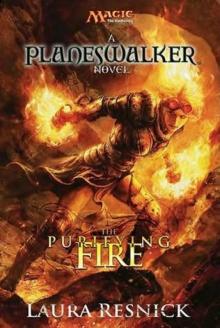 The Purifying Fire p-2
The Purifying Fire p-2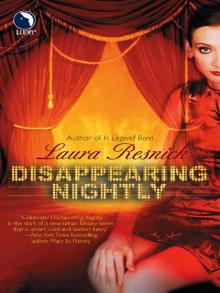 Disappearing Nightly
Disappearing Nightly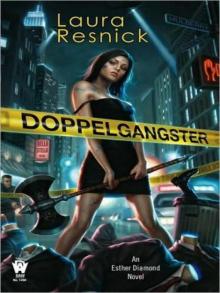 Doppelgangster
Doppelgangster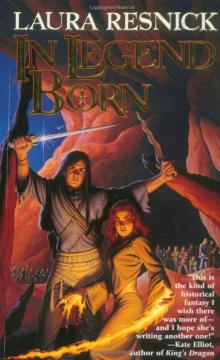 In Legend Born
In Legend Born The Destroyer Goddess
The Destroyer Goddess The Purifying Fire: A Planeswalker Novel
The Purifying Fire: A Planeswalker Novel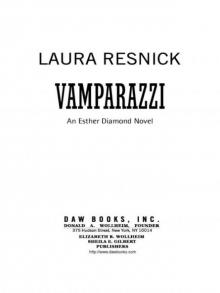 Vamparazzi
Vamparazzi A Wilder Name
A Wilder Name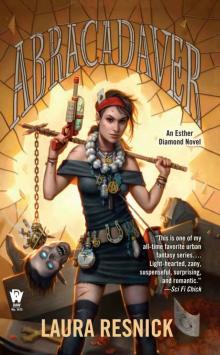 Abracadaver (Esther Diamond Novel)
Abracadaver (Esther Diamond Novel)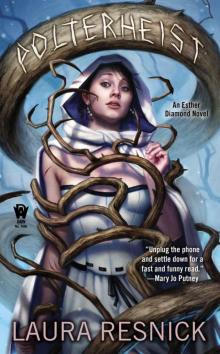 Polterheist: An Esther Diamond Novel
Polterheist: An Esther Diamond Novel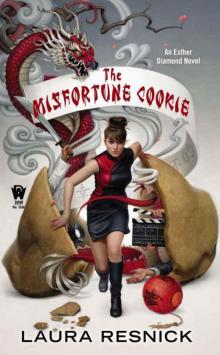 The Misfortune Cookie ed-6
The Misfortune Cookie ed-6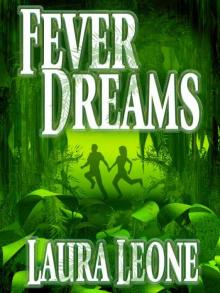 Fever Dreams
Fever Dreams The White Dragon
The White Dragon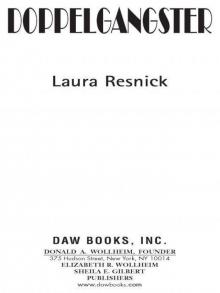 Dopplegangster
Dopplegangster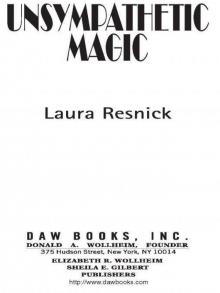 Unsympathetic Magic
Unsympathetic Magic